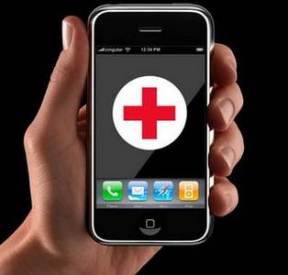Will medical apps be to healthcare what ATMs are to banking?
2 Aug, 12 | by BMJ
The mass adoption of smartphones among physicians has not only triggered an explosion of medical apps targeted at healthcare providers, it has also encouraged an emerging trend of health and wellness apps aimed at empowering patients. In fact, there are thought to be 40,000 medical applications available for download on tablets and smartphones, with the market still in its infancy.
Medical apps enable users to monitor health and encourage patient wellness on a moment-to-moment basis, instead of only during occasional visits to the doctor’s surgery. Some even replace devices used in hospitals and doctor’s offices, such as glucometers and high-quality microscopes used by dermatologists to examine skin irregularities.
http://www.youtube.com/watch?v=LJIL59OVR2Q&feature=player_detailpage#t=51s
There are also a number of apps that improve doctor-patient interaction. DrawMD lets doctors use interactive diagrams to show patients what’s happening with their bodies and exactly what will happen during various procedures. Alternatively, patients can use this app to get doctors to provide detailed visual answers to their questions.
Another app is enabling Mandarin- and Cantonese-speaking patients to communicate with their non-Chinese-speaking doctors about detailed medical problems. And another lets doctors forward links to online educational material to patient’s smartphones or tablets.
So far, the market has been unregulated for both doctors and patients. Many argue that it is difficult to know which apps actually live up to their health claims or provide accurate information.
Last year in the US, the FDA released a first draft of guidelines that require mobile app developers making medical claims to apply for FDA approval in the same way that new medical devices must be proved safe and effective before they go to market. As that process can be both time-consuming and expensive, there has been an obvious backlash from developers used to seeing mobile apps updated and created on a daily basis.
Healthcare professionals are incorporating apps into their practices to be more effective and efficient. Patients are using them to monitor specific aspects of their health, fill in gaps in their medical care and take more responsibility for their well-being. Both doctors and patients are finding that mobile apps can provide a fast and efficient way to stay in touch and exchange information.
When one needs banking services, the immediate thought is often, “Where is the nearest ATM?” So can medical apps really be the go-to resource for healthcare in the same regard?

10 of the best medical apps
1. Anatomy 3D: Organs (see video above)
Anatomy 3D: Organs teaches users about structure and function of internal organs using 3D models, videos, audio lectures, diagrams, quizzes and a glossary.
2. Visible Body
Visible Body’s 3D Human Anatomy Atlas gives medical students, doctors, and patients an up-close look at all the systems of the human body.
3. Baby Connect (Activity Logger)
Baby Connect tracks your baby’s everyday activities (including feeding, sleep, growth, health and vaccines) and creates graphical reports and trending charts.
4. Instant ECG: An Electrocardiogram Rhythms Interpretation Guide
Instant ECG is an app for health care professionals, which teaches the basics of reading electrocardiograms (ECG).
5. MedCalc (medical calculator)
MedCalc gives health care professionals access to more than 200 different diagnostic formulas, scores, scales and classifications that help measure a person’s health.
6. Best Practice decision support from the BMJ Group
Check guidelines & evidence, consult expert opinion, brush up on rare conditions, and confirm that you are taking the right actions.
7. Pill Identifier
Pill Identifier allows you to identify more than 10,000 different over-the-counter and prescription pills based on their appearance.
8. Diagnosaurus DDx
Diagnosaurus DDX helps health care providers accurately diagnose patients quickly at the bedside.
9. Everyday First Aid
Everyday First Aid offers users information on how to handle an emergency. The medical information is based on guidelines from the American Red Cross and other health organization.
10. Drugs & Bugs
Drugs & Bugs is an app for medical students and health care professionals who care for patients with infectious diseases.